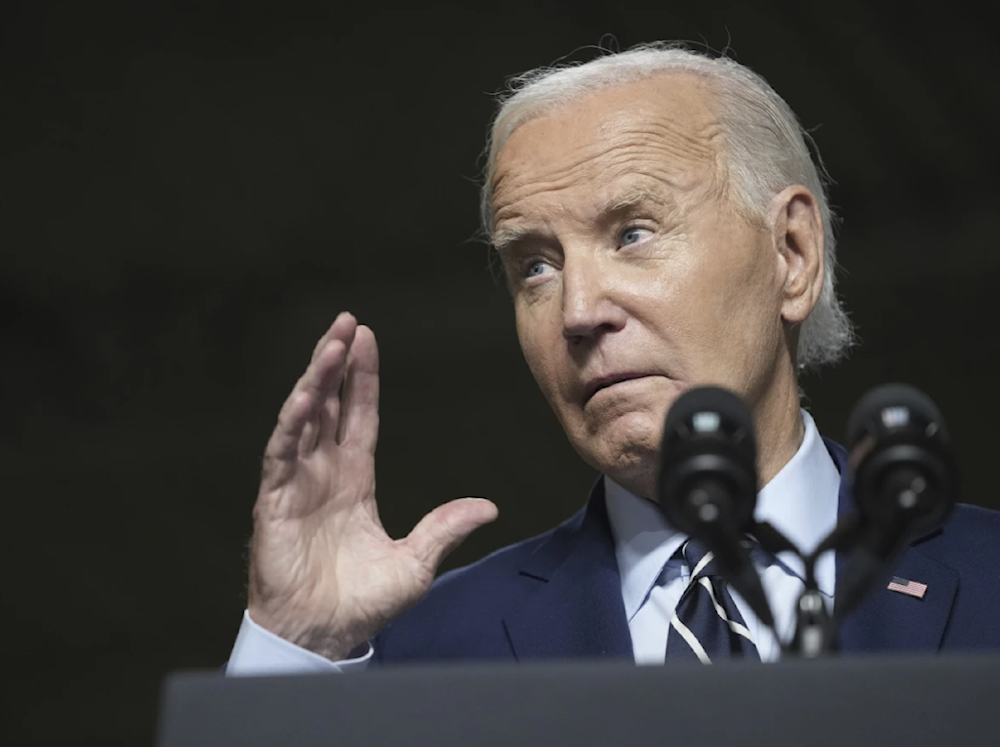Sanctions in lieu of hitting Iran oil facilities: US offer to 'Israel'
The US strategy is to provide Netanyahu with an out, allowing him to reject calls from hardliners in his coalition for considerably harsher reprisal.
-

President Joe Biden speaks at an event at the Milwaukee Department of Public Works in Milwaukee on October 8, 2024. (AP)
President Joe Biden has cautioned "Israel" not to attack Iran's nuclear installations, and US officials are concerned that an assault on the country's energy infrastructure may destabilize energy markets, Bloomberg reported. However, with the Israeli response against Iran likely at any time, the US has little confidence that the situation would not worsen further.
After Iran's Operation True Promise 2, Biden is desperately attempting to confine any Israeli response to military targets such as air bases and missile installations. To this end, rather than "Israel" targeting oil facilities or other economic targets, the US is offering options such as a new wave of economic sanctions, according to anonymous individuals familiar with the situation.
The US strategy is to provide Israeli Prime Minister Benjamin Netanyahu with an out, allowing him to reject calls from hardliners in his coalition for considerably harsher reprisal. It remains to be seen if he will accept it, especially considering that the Biden administration has so far refused to impose its views by suspending military aid to the occupation.
Vice President Kamala Harris' campaign wants to avoid the controversy from draining support in crucial states, particularly Michigan, which has a sizable Arab and Muslim American community. Netanyahu, who has openly boasted about his strong ties with Republican nominee Donald Trump, has shown little interest in helping her.
According to Ali Vaez, Iran Project Director at the International Crisis Group, "Escalation in the region helps Trump, which is also good for Bibi because it means not just four more weeks of unrestrained behavior, but four years of no American pressure."
On Wednesday, Biden and Netanyahu spoke for the first time in almost a month, with White House Press Secretary Karine Jean-Pierre describing the call as "direct" and "productive". It happened after Israeli Security Minister Yoav Gallant postponed a visit to the United States. An Israeli official, who requested anonymity to discuss the subject, said Netanyahu instructed Gallant not to leave until his cabinet authorized its response to Iran.
Gallant on Wednesday vowed that “our attack on Iran will be deadly, precise and above all surprising. They will not understand what happened and how it happened. They will see the results.”
Gallant misled the public into believing Iran's strike was a failure, something widely debunked in recent reports.
Read more: Devastating phase after Iran ability to breach 'greatest air defenses'
On his part, CIA Director William Burns warned of a "very real danger of a further regional escalation of conflict" at the Cipher Brief Threat Conference on Monday.
For the time being, the European Union is set to approve a package of penalties on Iran for providing Russia with missiles, which will include measures targeting engineering, metals, and aviation industries. Other allies are waiting to watch "Israel's" response before imposing fresh restrictions, according to some sources.
Former US Navy Admiral James Stavridis, now a Bloomberg opinion writer, said on Wednesday, “They’ll probably go against the military-industrial complex in Iran, probably not against the nuclear power complex, and probably not against energy,” adding that he believes there is a 1-in-4 chance of a broader war.

 3 Min Read
3 Min Read










